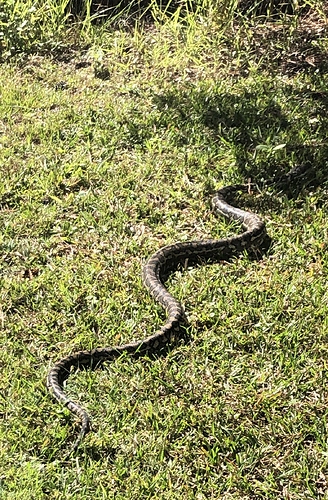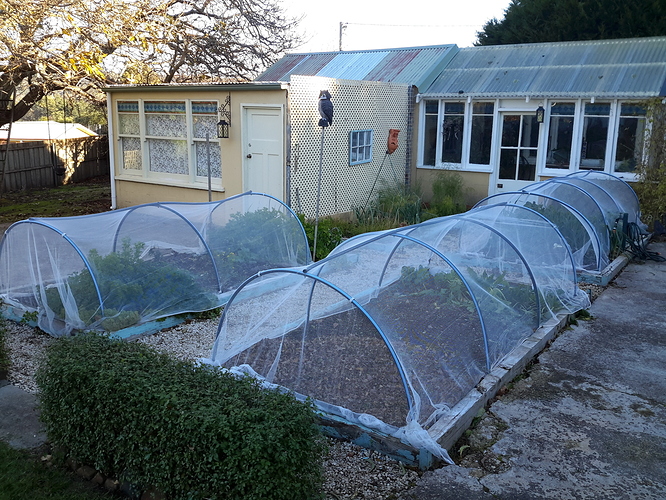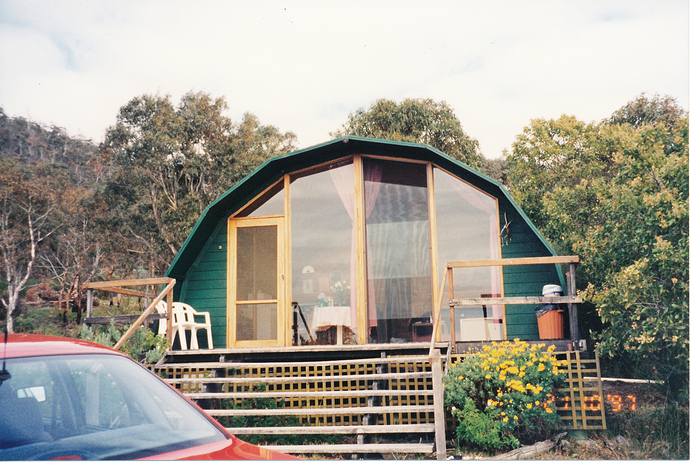For Cairns try a plain Terracotta pot. One that is not sealed. It needs good drainage, coming from rocky ground and slopes around the Mediterranean. Full sun, although ours grows fine with full shade for part of the day. They are drought tolerant. In Cairns it may be best to not have it out in the rain too often in summer?
Rosemary likes hot dry summers, grows best in a well drained soil in full sun.
Cairns hot humid summers may not be the most suitable but rosemary is a nice and adaptable plant ![]()
Where I am in inner Brisbane, the possums eat pretty much everything I plant. Any advice as to herbs they won’t like, or how to repel them, would be most welcome 
Possums are smart, superb athletes and dedicated to finding the weakness in any defence. Just about any kind of fruit, tender shoots or blossom is good tucker, they will detect anything you have that they like and go for it. I would love to be proven wrong but I doubt bad smells will keep them from a feed.
An electric fence does works on possums; also on dogs, cats, children and nosy neighbours. I can get harvest from my orchard because of a wire mesh fence with an electric wire on stand-offs 10cm to the side of the fence near the top. They cannot climb over it or squeeze under it without getting zapped. The power only needs to be on about one month a year while the stone fruit ripen. Before that I tried synthetic bird mesh all over (they chewed big holes in it each night) and chook wire from the ground about a metre high (climbed over it).
This may not be an acceptable solution in suburbia.
Possums are highly adaptable, as @syncretic notes.
There are commercially available chemical sprays that you need to apply to the plants they are eating. It sounds like too much trouble as they wash off with rain and watering.
If you can fence the area off or modify existing fences there are a number of options and designs. Any fence needs some type of device or strategy on the top. There are spiky metal toppers (EG Whites rural fencing) as well as a design option with a loose top wire.
https://goodlifepermaculture.com.au/tag/possum-proof-fence/
We used to have a possum problem around the house. No electric fence needed but not so urban suited.
Possums will also avoid dogs, however most of us pamper our urban pets and let them sleep inside. It’s worth looking for how the possum is accessing your garden and from where. There may be some other things that can be done to disrupt it’s travels.
Nothing works. You need a barrier/enclosure to be fully successful. If you have a yard/vege patch, these can be made very easily using poly water pipe (black with blue stripe) and bird netting. Something like this which is our vege patch…to keep out everything we can…
This is a great barrier for (most) birds, cabbage butterflies, cats etc. A possum will chew through the net easily if motivated. Unless the owl is a powerful owl.
Did I miss something? When did it become:
“keep possums out” Challenge? 

It seems possums have similar food tastes to humans. Tip pruning the young shoots of the young gums etc must get a little boring on the pallets. A garden full of soft and juicy herbs must be a relative delight for the senses.
Brush tails will also happily chow down on insects, in addition to leaves, flowers and fruit. Any system of netting the garden needs to be made from wire and the outer frame secured against a solid surface to prevent digging.
It is worth trying as you will be surprised how effective such netting is - ends and sides need to be pinned down with tent pegs, timber/star pickets or stones… If the vegetable patch was in a ‘desert’ or barren area where it was the only potential food source of a possum, then yes, they might try and get through the netting…but in such areas where wouldn’t be a possum community anyway.
We have numerous possums in the area (locals complain regularly about possums problems in their vege patches) and until we installed the netting, most things were mown off by possums (exceptions asparagus and onion family) making success growing of anything, especially herbs, impossible. As soon as the netting was installed the possum problem disappeared as it forced them to go back to their usual/other food sources (or jump the fence to other vege patches).
It is the second garden we have successfully used netting to exclude possums. One in Brisbane and the other (current garden in photo) in regional northern Tasmania.
It does have the added benefit of excluding some other vermin and larger insect pests. Downside, it makes managing and harvesting a little more difficult as one has to move the netting to access the vege patch and it isn’t the most attractive thing in the garden.
During trips to Tassie in 1997 & 1998, we stayed at a place on the South side of Bicheno which consisted of 3 curved roof buildings reminiscent of the huts the allies constructed in WWII.
The possums would run rampant over the roof of a night but the owners had a perfect fix to keep them out of their veggie patch.
They had a fence made of chicken wire with the top part or the mesh unsupported and curved outwards and downwards, thus making it impossible for the possums to climb over it.
The one I posted about had a gate so entry and exit was easy. I think the gate was made of iron sheeting which possums cannot climb but it may have been the same as the rest of the fence.
I don’t recall the name of the property and I could not find it with a Google search of accomodation in Bicheno or on Google maps so perhaps it has all changed.

Likely a convenience factor per the last observation.
It may be worth a try for some and if it does the job great. Experiences obviously differ.
Once the pet subject gets running, hard to stop. 
It would be interesting to know if any other members have used similar netting to protect the herb garden/vegetable garden…rather than voicing an opinion. In Tasmania and Brisbane, such netting is often used with success. The idea came from Gardening Australia a few years ago where they suggested similar netting system for possums.
I have a little wicking bed on a north facing balcony in Canberra. Despite the frosts the parsley, thyme and oregano thrived and the sage held it own. The chives succumbed to aphids in autumn and will be replanted once three Pak Choi plants are harvested.
Location: Sydney 10Km NW.
Chilies: We have tried growing chilies in the garden but get best return in large-ish pots. Cayenne and birds-eyes. I used to grow pequin (very hot, small and prolific - loves to grow in full sun and not in pots as the plant gets large) but hard to use due to them being so hot. My chilies stopped producing completely when the temperature got above 30 for an extended period.
I usually get Basil in pots from Wooly’s and often replant in bigger pot. They can keep going to a long time if you remember to use it or at least cut it back once in a while. I grow perennial Basil as backup as it can grow virtually anywhere as long as there is a bit of sun and you remember to water it once in a while.
I have grown Vietnamese mint (should actually be called Coreander as it is closer to that). It loves having wet feet and hates getting dry. I have stopped as I have persuaded my wife that we do not need it - to my nose it is foul - worse than Coreander.
Thyme in the garden when I can keep it alive.
Parsley as it seems to self-propagate and probably the nicest smelling one.
Oregano at the edge of the herb bed. It seems to like that.
Mint will grow everywhere but best in pots as it seems to take over. Plenty of water and likes a bit of a feed once in a while.
Rosemany in the herb bed as it is easy to grow.
Sage quite easy when you take care of it.
Tarragon semi-shaded. Beautiful in a lot of things and very easy to grow. It also has quite pretty flowers.
What I likes most is Bay. I always have a bay tree in a pot (we rent). I have never planted it in the garden as I would think it would get big quite quickly. I once grew one in a pot and it got to 2m before I forgot to water it for a couple of weeks. It HATES to get dry roots. It will die quite quickly - somewhere around a week even with a big tree.
I sometimes forget to take care of my herbs for an extended period in winter but most seem to survive. The ones that don’t I regrow in spring if I need it.
Why do you say that? Vietnamese mint is not closely related to true mint nor to coriander. None of these share the same genus, family or order.
Front garden perennials:
- Rosemary (as a hedge)
- Sage (normal and purple)
- Thyme (various varieties including culinary and lemon)
- Savoury
- Curry plant
- French lavender
- Caper bush
Back garden pots or beds:
- Parsley
- Chervil
- Chives
- Lemon Balm
- Mints
- Coriander
- Basil (normal and purple)
- Dill
- Borage
- Marjoram
- Nasturtium
- Sorrel
- Chamomile
- Curry leaf
I use the herbs in cooking and teas (tisanes).
I grow dill, lemon thyme, flat leaf parsley, oregano, rosemary, chives, garlic chives and mint. And basil in the summer (very cold climate). I let dill and parsley go to seed and save the seeds, the dill flowers are fabulous for attracting pollinators and if you scatter a handful of seeds they will pop up everywhere and really help with veggie pollination. All these are very hardy apart from the basil.
A few interesting ideas about herbs:


